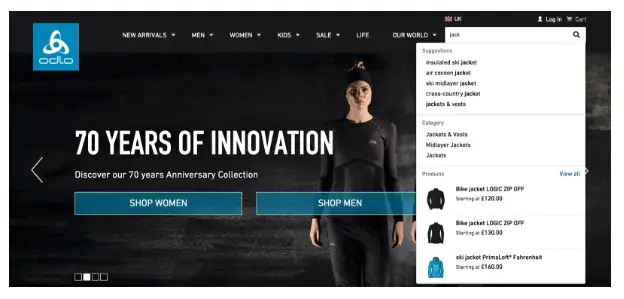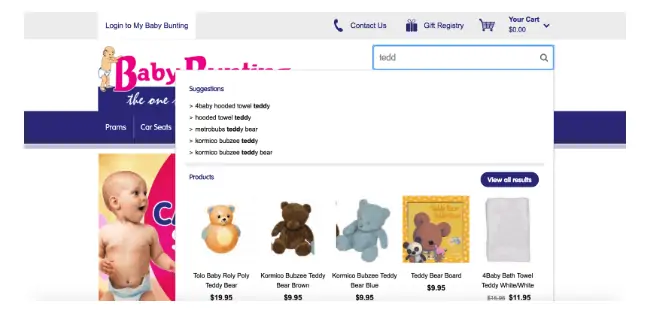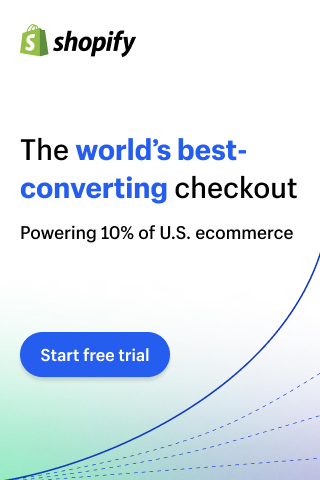In today’s constantly evolving retail climate, the quest for improving customer loyalty, conversion rates, average order values and repeat purchase rates is an ongoing one, with each of these areas require a long-term strategy and considerable investment in resource and budget.
One area of ecommerce that is garnering a great deal of attention currently is on site search. If a retailer’s site search performs poorly, it has a direct impact on the bottom line, with fewer sales, lower order values and reduced customer satisfaction, as well as impacting the customer’s overall experience. Rather than allocating internal resource to optimising and developing existing search technology, many retailers are looking at specialist search solution providers for an integration into their existing ecommerce platform. In this article, we examine the key features of the major on site search systems, to guide retailers who are drawing up a requirements spec for this type of integration project.
Smart Search Is The New Standard
Text-based search, operating on a straight keyword matching basis, has more or less had its day, in the world of ecommerce. That approach led to weak result sets, often laden with irrelevant results, or worse, offering ‘zero results’ pages for even quite basic searches.

Natural language processing (NLP) is now the preferred approach for search giants such as Google and Bing, and ecommerce search is following quickly in their footsteps. NLP offers a semantic approach, focussing on meaning and relevance, rather than simple keyword matching. Smart, self-learning technology allows on-site search tools to better understand search intent, and therefore to serve up more relevant results. The faster a visitor finds what they are looking for on an ecommerce site, the more likely they are to buy, and the more likely they are to buy again in future. It’s easy to see, therefore, why NLP is creating such a stir in the enterprise ecommerce market.
Most NLP-based search frameworks can handle misspellings, synonyms, regional variations, singular and plural variants and much more. As the technology develops, the ability to handle weights and measurements is becoming standard. A platform that can handle weights and measurements can deliver highly accurate results. For example, a search for a 50” plasma TV will only return results for 50” TVs, and not for larger or smaller models.
Auto Suggest & Auto Correct
Working hand in hand with an NLP-based engine, auto suggest and auto correct tools can help deliver higher levels of customer satisfaction, and can help reduce the chances of a ‘No Results Found’ page being returned – as well as speeding up the purchasing process.

Auto suggest works by starting to search a store’s product catalog for relevant matches after the customer has entered just two or three characters from their search term. Often, this is enough to accurately identify the most likely products that the customer is looking for. By displaying auto suggest results in a dropdown from the search box, the store can help the customer to reach those products quickly, and can reduce the chances of errors being introduced. If a match isn’t shown after the first few characters, the visitor simply continues to type – with the displayed results being updated with every additional character.
When executed well, this approach is extremely popular with customers. If auto suggest is slow or offers irrelevant results however, it can quickly frustrate the visitor, potentially leading to cart abandonment. It’s vital therefore, that any auto suggest tool should be underpinned by a super fast and highly accurate search engine.

Sitting alongside auto suggest is auto correct. Typos and misspellings are incredibly common in search, whether organic search or ecommerce on-site search, and even more so when visitors are using a mobile device to access a website. Autocorrect allows the on-site search platform to understand what the customer intended to search for and to deliver those results directly, instead of displaying a message such as ‘We don’t understand your query, please check your spelling’.
Powerful Merchandising Tools
One of the weak points of many traditional ecommerce search tools is that results were displayed in a more or less random order, with no merchandising opportunities or any form of coherent presentation. The new wave of ecommerce search tools tackle this head on, with strong merchandising tools, to present results in an engaging and optimised way.
Enterprise level ecommerce search tools typically allow store owners to control the display in both the drop down results box and the main results page. Configurable options might include whether to display product thumbnails, names, descriptions, prices and more. A smart search solution, like Klevu, has both self-learning capabilties and the ability to boost products, categories and attributes, as well as content pages. Other elements that can lead to higher conversion rates include merchandising badges such as ‘New In’, ‘Save 20%’, ‘Free Delivery’ and so on, as well as ratings stars and review counts.
Faceted Search for Ecommerce
With larger ecommerce players offering vast product catalogs often running into the tens or hundreds of thousands of SKUs, even the smartest search tools need some additional help, to allow the customer to filter search results further in order to reach a purchasing decision.

Faceted search provides this facility by displaying an additional sidebar on results pages, which allows the customer to refine their search by a range of criteria. These criteria typically include attributes such as size, colour, brand and price band, but may cover more specific attributes such as material or other elements such as how many star ratings the products have. Again, an enterprise-level solution, like Klevu, would use the attributes from your product catalog or feed and also allow for manual input around filtering as well.
Analytics & Reporting
Having smart self-learning technology powering on-site search is a crucial step towards maximising the potential of ecommerce search, but without robust analytics, many of the potential benefits could be lost. As well as enabling the self-learning element of on-site search, search data enables store owners to better understand what their customers are looking for, and how they are interacting with the store.
Reports showing the most commonly searched-for items on an ecommerce site can help guide purchasing decisions, and can provide opportunities for increasing markups and profits. Conversely, zero result reports and reports highlighting searches that convert poorly into sales can be very useful, as they show where improvements need to be made, either in product data, inventory management or other areas. These reports can even identify potential new product lines not currently stocked.

Mobile Optimisation
It goes without saying that any enterprise level search solution should be 100% mobile-compatible, since more and more shoppers are choosing to use mobile devices for the majority of their online activities and site search can reduce the time to product detail page considerably on mobile.
Search needs to fit seamlessly into a smooth and efficient mobile experience for customers, so that they have the confidence to press the all-important ‘Buy Now’ button. In fact, given the limitations of traditional site navigation on mobile devices, search is arguably even more important for mobile than for desktop access.
It’s clear from this feature list that on-site search is changing dramatically. It is finally leaving behind the traditional keyword-focussed algorithms of the early days of ecommerce, to replace them with something altogether more powerful. With technology really starting to properly understand what we, the customers, really want, there is enormous potential for forward-thinking retailers to use that technology to drive substantial business growth.
Author Paul Rogers works as a consultant for Klevu, who are an innovation-led search startup who power search functions for mid-level and enterprise-level online retailers from all over the world.
The key benefits of using Klevu are focused on the self-learning capabilities (auto-merchandising queries based on user behaviour), natural language processing (improved query understanding) and advanced reporting, amongst other features. Klevu are headquartered in Helsinki, Finland but have also recently opened a UK office.
